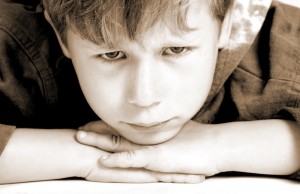
If you feel that your child isn’t having the appropriate emotional responses, or if he or she is acting out in ways that are dangerous or harmful, ask your Durham divorce lawyer for the name of a local counselor or therapist who can help.
Kids and Aggression During Divorce
Many psychiatrists suggest that anger is nearly always a mask for pain, particularly during divorce. Kids may be hurt that you and your ex have gone your separate ways, and they could act out aggressively. Whether your kids are getting in fights at school or having a difficult time getting along with siblings, aggression is a serious issue that you’ll need to handle right away.
Toddlers and aggression during divorce: Toddlers often use aggression to cope with fear. It’s an emotional response that they don’t have much control over; they’re still learning how to control their impulses. If your toddler lashes out aggressively, psychologists suggest that you stop what you’re doing and get down on his or her level. Try to encourage your toddler to use words to describe feelings instead of physical actions.
Preschoolers or school-aged kids and aggression during divorce: Aggression isn’t limited to boys during divorce; girls often become aggressive as well. If your preschooler starts acting aggressive, psychologists say that you should sit down and engage in a dialogue aimed to get to the root of the problem: your child’s feelings.
High-school kids and aggression during divorce: High-schoolers are usually just learning about their own emotional responses, and it’s often a very confusing time. Aggression can be particularly dangerous in high-schoolers, and you’ll need to have a discussion with your ex about the way your teen is behaving. Presenting a united front – even if you have difficulty getting along – is generally the best way to tackle your teen’s difficult emotions.
Asking the Right Questions
Your child may be upset about the way your child custody agreement upsets his or her schedule, or he or she might be engaging in self-blame for the divorce. Any number of things about your divorce, particularly when divorce is combined with the ordinary aches and pains of growing up, could be bothering your child. In many cases, talking to a counselor or therapist can help fix the situation.





